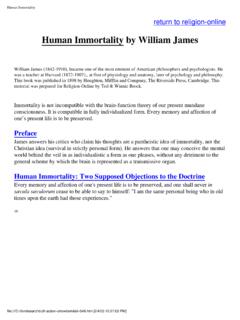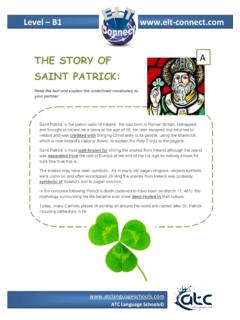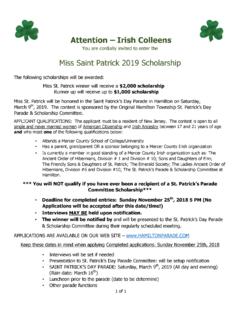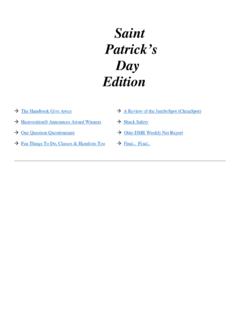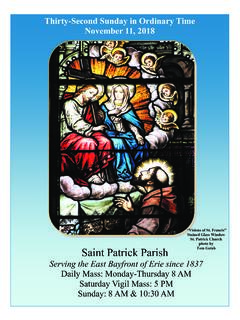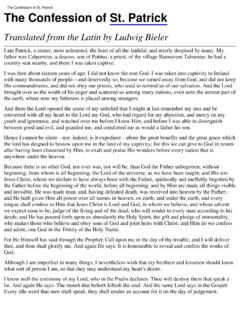Transcription of T IGITAL IBRARY COLLECTED WRITINGS - media.sabda.org
1 THE AGES DIGITAL LIBRARYCOLLECTED WRITINGSTHE WRITINGS OFST. PATRICKby saint PatrickBooks For The AgesAGES Software Albany, OR USAV ersion 19972 THE WRITINGS OF ST. PATRICKTHE APOSTLE OF IRELANDA REVISED TRANSLATION WITH NOTES CRITICALAND HISTORICALBY THEREVEREND CHARLES H. H. WRIGHT, Coll., Dublin, of Exeter Coll., Oxford, ofUniversity of Leipzig, Donnellan Lecturer (1880-81) in Universityof Dublin, Examiner in the University of London, BamptonLecturer (1878), and Grinfield Lecturer on the LXX. in theUniversity of Committee of the Religious Tract Society have undertaken the issue ofthe famous theological treatises included in this Series in the hope that theywill be widely read and studied, not only by professed students, but also bythe thoughtful general readers of the present treatise is complete in itself, and, as far as possible, gives the full textexactly as it came from the pen of the author, even when adherence to thisprinciple involves variation in bulk and price.
2 And the occasional retentionof a few passages not fully in accord with the general teaching of theSociety. The reader, as a rule, will easily discover these, and will not fail tosee their importance in illustrating the weakness, as well as the strength, ofthe Christian opinion of other days. Care is taken to note such passageswhere there appears to be need for so INTRODUCTION2. BRIEF SKETCH OF ST. patrick S LIFE3. GENUINE WRITINGS OR patrick .(a) The Hymn, or Breastplate (b) The Confession(c) Epistle to Coroticus4. DOUBTFUL REMAINS.(a) Sayings of patrick (b) Proverbs of patrick (c) The Story of patrick and the Royal Daughters(d) patrick s Vision of the Future of Ireland(e) A Confession attributed to St.
3 patrick , from the Revue Celtique5. APPENDIX POETICAL VERSIONS OF THE HYMN.(a) Version of James Clarence Mangan(b) Version of Mrs. Alexander(c) Version of Joseph John MurphyNotes on patrick s HymnConfessionEpistle to CoroticusThe Confession of Tours6. THE ANCIENT IRISH HYMN IN THE ORIGINAL IRISH, WITH ATRANSLATION INTO MODERN IRISH, BY THE LATE REV. PROFESSORGOODMAN, present edition of the WRITINGS of St. patrick is an attempt to bring outin English the works of that great man, with the necessary addition ofhistorical and critical note but with the omission, as far as possible of allmatter which has been made the subject of religious controversy.
4 In theearlier editions of this work, which were issued nominally under the jointeditorship of Revelation G. T. Stokes, , Professor of EcclesiasticalHistory in the University of Dublin, and myself, a special attempt wasindeed made to avoid touching upon every point likely to arousecontroversy. It was hoped that an impartial edition of patrick s workswithout controversial notes or comments might have been useful andacceptable to Irishmen of various creeds and opinions, as well as to EnglishChristians, who, in general, know little of the great Apostle of Ireland.
5 F1 The utter impossibility of publishing in Ireland any work of the kind whichwould be regarded with equal favor by Roman Catholics and Protestantswas abundantly proved in this case. An eminent Irish scholar, a RomanCatholic priest, who died some time after the publication of the earliereditions, was asked to join with me as co-editor of the work, in order tosecure its impartiality. He, however, stated that he could not approve ofpublishing St. patrick s WRITINGS without theological notes, and that hewould require to be permitted to point out that even the occasional use byPatrick of the term sacerdos (priest) to indicate a Christian minister wassufficient to prove that St.
6 patrick believed in the Roman Catholic doctrineof the sacrifice of the mass. Of course under such conditions it wasimpossible to accept his services. The Irish Catholic, a Dublin RomanCatholic weekly journal, in a review of the work after its publication,similarly maintained that the omission in the work of any discussion of thequestion whether patrick received a commission from Rome or not wassimply the suppression of everything in the shape of argument on theCatholic side! The work, however, was, on publication, warmlycommended by a Roman Catholic prelate in Ireland, but he declined topermit his commendation to be is no allusion whatever in St.
7 patrick s WRITINGS to his havingreceived any commission from the Pope. If, therefore, he did receive acommission from Rome a point on which no trustworthy evidence can be6adduced the silence of patrick on the subject would prove that heattached no such importance to such a commission as his mediaevalbiographers were disposed to affirm. But, as Dr. Stokes has well pointedout, in his work on Ireland and the Celtic Church (p. 51), the question isfrom a Protestant standpoint, of little importance, and if the evidencebrought forward in favor of the Roman claim were strong enough weshould have no hesitation whatever in admitting the who are interested in such investigations can easily consult forthemselves the arguments brought forward on the subject in Professor Stokes work, and dwelt upon with more fullness of detail in Dr.
8 Todd sSt. patrick , the Apostle of Ireland. It is, therefore unnecessary here toenter upon that thorny subject of discussion. It may be however, noted inpassing, that the first of the sayings of patrick preserved in the Book ofArmagh, and given in the present volume among the doubtful remains ofthe saint , alludes to the face of patrick s having visited is nothing, however, to show where those Dicta came from, andtherefore they cannot be regarded as conclusive evidence. It is, however,quite true that St. patrick s autobiography, as set forth in his Confession,passes over in silence the events of many the present work the Latin term sacerdos has been invariably translated priest, presbyterus has been rendered presbyter, and clerici clergy.
9 In some of the Roman Catholic editions the latter term has been translated priests. It must be observed that early Celtic Christianity was very different in itsexternal form from the Christianity of modern times, whether RomanCatholic or Protestant. Many usages which were afterwards distinctfeatures of the Celtic Church of Ireland, and which appear to have been thegrowth of later days, are not alluded to in patrick s WRITINGS . St. patrick swritings are indeed brief and scanty, but are clear enough on the essentialpoints of Christian doctrine. No such exaggerated views on the celibacy ofthe clergy were held by patrick as were afterwards prevalent, for hementions without scruple the fact that both his father and grandfather wereclergymen.
10 On the other hand, he speaks with approval of monks andvirgins, which were not in his days recluses like those described inProfessor G. T. Stokes ninth lecture. patrick also quotes passages of theOld Testament apocryphal books which he evidently viewed as inspiredScripture. In spite of all these drawbacks, as Protestants must regard them,7the WRITINGS of the saint are in the main strongly evangelical, and cannot failto be perused by all Christians with both pleasure and the present edition we have divided the remains of patrick into twodivisions.

